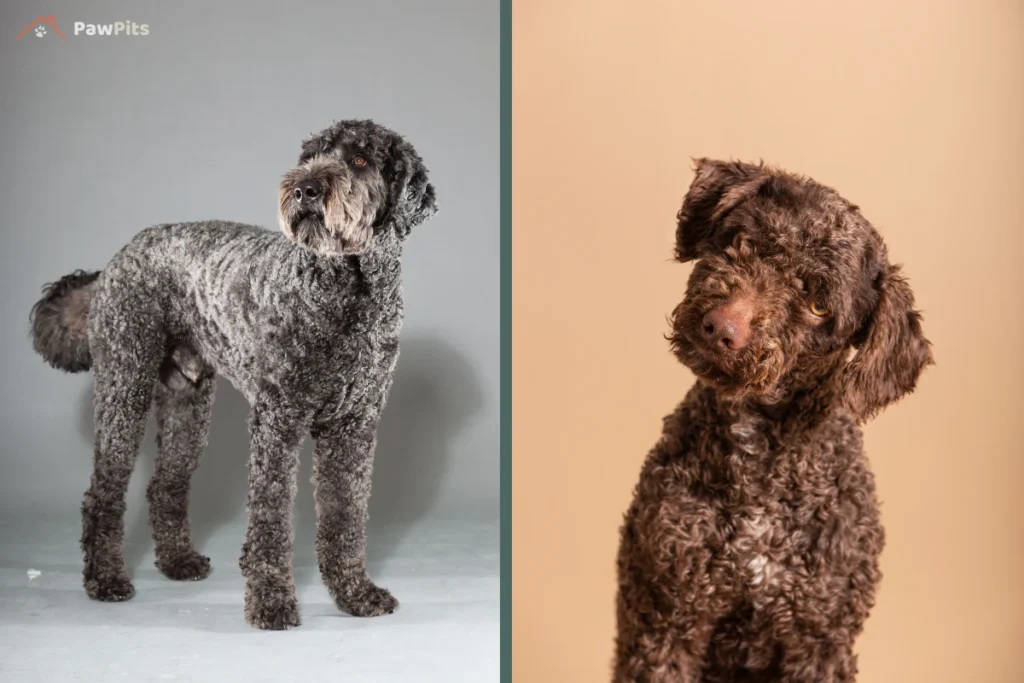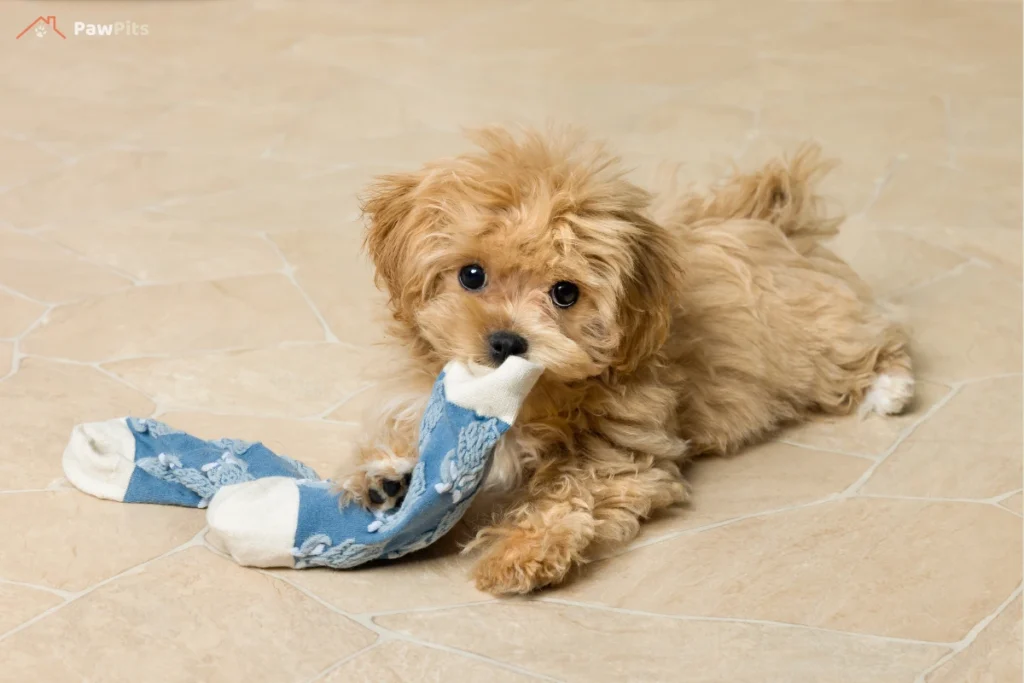Aussiedoodle

The Aussie Doodle is a friendly dog that comes from crossing an Australian Shepherd and a Poodle. It’s known for its smart and friendly nature. As an owner, you must keep your Aussie Doodle happy and healthy. This guide will help you with that, covering all the important care and health tips.
Key Takeaways
- Understand the Aussie Doodle breed’s origins, physical characteristics, and temperament
- Learn about the important health considerations for your Aussie Doodle
- Discover the optimal nutrition, exercise, and grooming requirements for your Aussie Doodle
- Explore effective training and socialization techniques to build a strong bond with your Aussie Doodle
- Identify common health issues and preventive measures to keep your Aussie Doodle thriving
- Recognize the key factors to consider when selecting a healthy Aussie Doodle puppy from a reputable breeder
- Maintain your Aussie Doodle’s overall well-being through a holistic approach to their care
Understanding the Aussie Doodle Breed
The Aussie Doodle is a mix of the Australian Shepherd and the Poodle. It has won the hearts of many dog lovers. This breed has a rich history and comes in many looks and personalities.
Origins and Breed History
The Aussie Doodle comes from the Australian Shepherd and the Poodle. The Australian Shepherd is smart and loyal. The Poodle is known for its soft coat and fun nature. By mixing these two, we got the Aussie Doodle, a dog with the best of both worlds.

Physical Characteristics and Temperament
Aussie Doodles have different fur types and colors. They can have the Poodle’s curly fur or the Australian Shepherd’s shaggy look. Their eyes are often blue, brown, or hazel, making them stand out. They are friendly, full of energy, and very smart, making them great for families who love to stay active.
Size Variations from Mini to Standard
- Mini Aussiedoodle: Typically stands between 12 to 18 inches tall and weighs 15 to 35 pounds.
- Standard Aussiedoodle: Can reach heights of 18 to 24 inches and weigh 35 to 65 pounds.
Aussie Doodles fit well in many homes, big or small. They are easy to adapt and love to please. This makes them a favorite among dog owners looking for a loving and loyal pet.
Essential Health Considerations for Your Aussie Doodle
Owning an Aussie doodle is a big responsibility. These dogs are smart and loving and come from a mix of Australian shepherds and poodles. This mix can lead to health issues you need to watch out for.
Genetic Predispositions
Aussie doodles might get certain health problems. These include hip and elbow dysplasia, progressive retinal atrophy, and Von Willebrand’s disease. Good breeders check for these before selling. But, it’s up to you to watch your dog’s health with regular vet visits.
Common Health Concerns
Aussie doodles can also face other health issues. These include:
- Skin allergies and sensitivities
- Ear infections because of their floppy ears
- Being overweight can lead to more problems with our joints.
- Dental problems if you don’t take care of their teeth
Preventive Care Measures
To keep your Aussie doodle healthy, take these steps:
- Go to the vet regularly for check-ups and tests
- Feed them a balanced, high-quality diet
- Make sure they get enough exercise to stay at a good weight
- Keep their coat and skin clean with regular grooming
- Start socializing and training them early for their mind
Knowing about the health needs of Aussie doodles is key. It helps them live a long, happy life. Whether you’re thinking of getting one or already have one, learning about their health is important.
Nutrition and Dietary Requirements
Keeping your aussie doodle or mini aussiedoodle healthy means a balanced diet. Knowing what to feed them, how often, and what to avoid is key. This affects their happiness and health.
Recommended Food Types
Choose high-quality, protein-rich dog foods for your aussie doodle or mini aussiedoodle. Look for foods with lean meats, whole grains, and essential vitamins and minerals. Avoid artificial preservatives, colors, and flavors to keep them healthy.
Feeding Schedule and Portions

- Puppies: Feed your aussie doodle or mini aussiedoodle puppy three to four small meals a day. This supports their fast growth.
- Adults: Feed them two meals a day when they’re grown. Adjust the size based on their age, activity, and health.
- Watch portion sizes to avoid obesity. Stick to the serving sizes on the food packaging and adjust as needed.
Common Food Allergies
Aussie doodles and mini aussiedoodles might have food allergies. These can include grains, dairy, or certain proteins. If they show signs like skin issues or energy changes, see your vet. They can help find and fix food sensitivities.
| Food Allergen | Potential Symptoms | Recommended Action |
|---|---|---|
| Grains | Itchy skin, digestive problems | Switch to a grain-free dog food |
| Dairy | Diarrhea, vomiting, gas | Avoid dairy products in your dog’s diet |
| Certain Proteins | Skin rashes, ear infections | Experiment with different protein sources |
“Paying close attention to your aussie doodle or mini aussiedoodle‘s dietary needs and making adjustments as needed can help ensure they live a long, healthy, and happy life.”
Exercise Needs and Activity Levels
Aussiedoodle adults and aussie poodles are full of energy and smart. They need to engage in plenty of physical activities and mental games to remain happy and healthy. Without enough exercise, they might get bored or restless.
For your aussiedoodle, try to give them at least 60 minutes of fun each day. You can mix up activities like:
- Brisk walks or jogs
- Playtime in a fenced yard or dog park
- Agility training or obstacle courses
- Retrieving games and other interactive fetch activities
- Swimming, if your aussie poodle enjoys the water
But it’s not just about physical play. Aussiedoodle adults also need mental challenges. Use puzzle toys, training sessions, and other activities to keep their minds sharp.
| Exercise Requirement | Frequency | Duration |
| Physical Activity | Daily | At least 60 minutes |
| Mental Stimulation | Daily | 20-30 minutes |
“A tired dog is a well-behaved dog. Ensuring your aussiedoodle gets enough exercise and mental stimulation is key to their overall happiness and health.”
By giving your aussie poodle the right amount of exercise and mental play, you can avoid bad behavior. It also helps them stay at a healthy weight and strengthens your bond with them.
Grooming Requirements and Maintenance
Keeping your Aussie Doodle well-groomed is key for their health and looks. Both standard and mini aussiedoodles need regular grooming. It’s important for their overall well-being.
Coat Care and Brushing Techniques
The Aussie Doodle’s curly or wavy coat needs careful brushing. This prevents matting and keeps it soft and fluffy. Make sure to brush your dog a couple of times each week to keep their fur healthy and free of tangles.
Use a slicker or pin brush to work through the coat gently. Pay special attention to the legs, tail, and neck. These areas tend to get tangled easily.
Bathing and Professional Grooming
Bathe your Aussie Doodle every 4-6 weeks. Use a gentle, sulfate-free shampoo made for dogs. Spot-clean them as needed to keep their coat fresh.
Also, take them to a professional groomer every 8-12 weeks. They can give a thorough grooming, including a haircut, nail trim, and ear cleaning.
Nail Care and Dental Hygiene
• Trim your Aussie Doodle’s nails every 2-4 weeks to prevent overgrowth and discomfort.
• Brush their teeth 2-3 times per week using a soft-bristled toothbrush and dog-safe toothpaste to maintain good dental health.
By keeping up with grooming, you’ll ensure your Aussie Doodle stays comfortable, healthy, and looks great.
Training and Socialization Tips
Raising an aussiedoodle puppy is a rewarding experience. These smart dogs love to please and do well with positive training. By using good training methods and socializing them, you’ll have a wonderful pet.
Cultivating an Obedient Aussie Doodle
Start training your aussiedoodle puppy early. Show them simple instructions like “sit,” “stay,” “come,” and “heel”. Use treats, praise, and patience to encourage good behavior. A regular, fun training routine is important.
Socializing Your Aussie Doodle
Socialization is key for your aussie poodle’s growth. Help them explore a variety of people, animals, and locations in a fun and safe manner. This will make them confident and friendly in various situations.
• Sign up for obedience classes or puppy social groups for positive interactions.
• Take your aussie doodle to pet-friendly places like parks or cafes for new experiences.
• Have visitors interact with your aussiedoodle, rewarding them for calm behavior.
Follow these tips for training and socializing your aussiedoodle. With patience, consistency, and positive reinforcement, your aussie poodle will be a happy, well-adjusted pet.
Common Health Issues and Prevention
As an Aussie doodle owner, knowing about health concerns is key. These dogs, a mix of Australian Shepherd and Poodle, might get health issues from their parents. By understanding these issues and taking steps to prevent them, you can keep your Aussie doodle happy and healthy.
Genetic Health Concerns
Aussie doodles might face genetic problems like hip and elbow dysplasia, progressive retinal atrophy, and von Willebrand’s disease. These issues come from their parents, so choosing a responsible breeder is crucial. They should test for these conditions and provide health clearances.
Regular Health Screenings
• Routine veterinary check-ups: Schedule annual or bi-annual visits to monitor your Aussie doodle’s overall health and catch any issues early.
• Specialized testing: Depending on your dog’s age and risk factors, your veterinarian may recommend genetic testing, hip and elbow evaluations, or other specialized screenings.
• Dental cleanings: Maintain your Aussie doodle’s dental health with regular professional cleanings and at-home brushing.
Preventive Care Measures
1. Balanced nutrition: Feed your Aussie doodle a high-quality, age-appropriate diet to support their overall health and development.
2. Exercise and activity: Provide your Aussie doodle with regular exercise to maintain a healthy weight and joint function.
3. Grooming and hygiene: Regularly brush your Aussie doodle’s coat and trim their nails to prevent any skin or foot-related issues.
By being proactive and attentive to your Aussie doodle’s health, you can prevent or manage common issues. This ensures your dog lives a long, happy, and healthy life. Remember, catching problems early and preventing them is vital for your dog’s well-being.
Selecting a Healthy Aussie Doodle Puppy
When looking for your new Aussie Doodle pup, choose a reputable breeder. These breeders focus on the health, temperament, and happiness of their dogs. They ensure you get a pup that will do well in your home.
Look for breeders who offer health certifications, open breeding practices, and a focus on matching puppies with the right families.
Reputable Breeder Guidelines
A good Aussie Doodle breeder will share health records, genetic tests, and info on the pup’s parents. They should answer your questions and help you pick the right puppy for your home. Stay away from breeders who only want to sell you a puppy.
Health Certifications to Look For
Ask for certifications from the Orthopedic Foundation for Animals (OFA) and the Canine Eye Registry Foundation (CERF). These show the parents have been checked for genetic issues like hip and elbow problems, and eye conditions.
Red Flags When Buying
Watch out for breeders who can’t show you health records, have bad breeding practices, or won’t let you meet the puppy’s parents. Also, be wary of ads for “aussiedoodle puppies for sale” or “mini aussiedoodle” that seem too good to be true. These might be signs of puppy mills or bad breeding.
By finding a reputable breeder, you’ll get a healthy, happy Aussie Doodle. This pup will be a loving part of your family for many years.
FAQ
What is an Aussie Doodle?
An Aussie Doodle is a mix of an Australian Shepherd and a Poodle. They have the friendly, smart, and active traits of the Australian Shepherd. Plus, they have the Poodle’s hypoallergenic, curly coat.
What are the different size variations of Aussie Doodles?
Aussie Doodles come in mini, medium, and standard sizes. The size depends on the Poodle parent. Mini Aussie Doodles are the smallest, and standard ones are the largest.
What are the common health concerns for Aussie Doodles?
Aussie Doodles might face health issues like hip and elbow dysplasia, progressive retinal atrophy, and epilepsy. Regular vet visits, preventive care, and careful breeding can help manage these problems.
What is the best way to groom an Aussie Doodle?
Grooming an Aussie Doodle regularly is key to their coat health and to prevent matting. They need brushing, baths, and professional grooming every 6-8 weeks. Don’t forget about nail care and dental hygiene for their overall health.
How much exercise do Aussie Doodles need?
Aussie Doodles are very energetic and need lots of daily exercise. They love hiking, swimming, agility training, and playing. Giving them enough physical and mental activity is vital for their happiness and health.
What should I look for when selecting an Aussie Doodle puppy?
When picking an Aussie Doodle puppy, choose a reputable breeder who cares about their dogs’ health. Look for breeders who do genetic and health screenings, provide health certificates, and are open about the breed’s traits and potential issues.


2 thoughts on “Aussiedoodle Health and Care Guide”